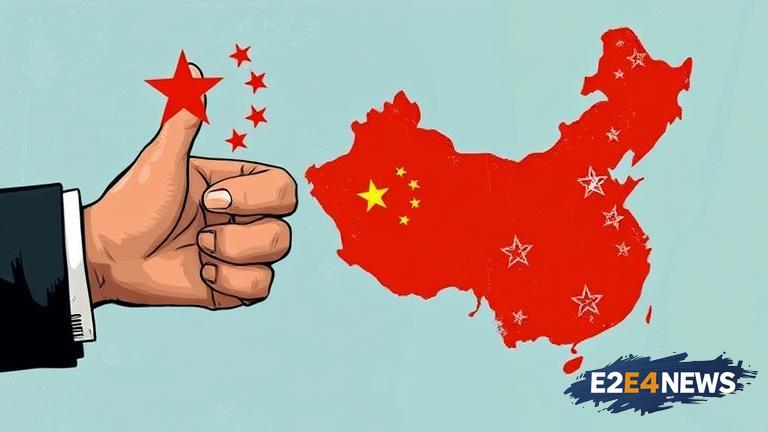The United States, a beacon of democracy, is facing a new challenge in the form of China’s increasing influence on its electoral process. Recent reports have highlighted how China is using its vast economic and diplomatic resources to shape the outcome of elections in America’s biggest city. This phenomenon has sparked widespread concern among policymakers, scholars, and the general public, who fear that foreign interference could undermine the integrity of the democratic system. China’s influence on US elections is a complex issue, with multiple factors at play. On one hand, China’s economic interests in the US are significant, with the country being one of the largest trading partners of the US. Chinese companies have invested heavily in various sectors, including real estate, technology, and finance, creating a web of economic relationships that can be leveraged to influence political decisions. On the other hand, China’s diplomatic efforts have also been geared towards shaping public opinion and policy discourse in the US. The Chinese government has established a network of think tanks, research institutions, and cultural centers in the US, which serve as platforms for promoting Chinese interests and perspectives. Furthermore, China has also been using social media and other digital platforms to disseminate its message and influence public opinion. The use of social media bots, fake accounts, and other forms of disinformation has become a major concern, as it can be used to manipulate public opinion and sway electoral outcomes. The city of New York, being a global financial hub and a center of political power, has become a key target for China’s influence operations. Chinese diplomats and business leaders have been actively engaging with local politicians, business leaders, and community groups, building relationships and promoting Chinese interests. The Chinese government has also been providing financial support to various community organizations and cultural events, which can be used to build goodwill and influence public opinion. However, the extent of China’s influence on US elections is still a matter of debate. While some experts argue that China’s influence is significant and poses a major threat to democratic integrity, others contend that the impact is limited and can be mitigated through existing laws and regulations. The US government has taken steps to address the issue, including the passage of the Foreign Agents Registration Act (FARA), which requires foreign agents to register with the Department of Justice. However, more needs to be done to address the complex and evolving nature of China’s influence operations. The US needs to develop a comprehensive strategy to counter China’s influence, including improving transparency and disclosure requirements, enhancing public awareness and education, and strengthening laws and regulations to prevent foreign interference. Ultimately, the integrity of the democratic system depends on the ability of the US to protect itself from foreign influence and ensure that the electoral process is free and fair. The US must also work with other countries to develop a global framework for preventing foreign interference in elections, recognizing that this is a shared challenge that requires a collective response. As the world’s largest democracy, the US has a responsibility to lead by example and demonstrate its commitment to democratic values and principles. The issue of China’s influence on US elections is a complex and multifaceted one, requiring a nuanced and comprehensive approach. It is essential to recognize the various ways in which China is seeking to influence the electoral process, including through economic, diplomatic, and cultural means. By understanding these dynamics, the US can develop effective strategies to counter China’s influence and protect the integrity of its democratic system. The US must also be aware of the potential risks and consequences of China’s influence, including the potential for foreign interference, disinformation, and manipulation of public opinion. By taking a proactive and comprehensive approach, the US can ensure that its democratic system remains robust and resilient, and that the electoral process is free from foreign influence. The US government, civil society, and the private sector must work together to address this challenge, recognizing that the integrity of the democratic system is a shared responsibility. The US must also engage with other countries and international organizations to develop a global framework for preventing foreign interference in elections, recognizing that this is a shared challenge that requires a collective response. In conclusion, China’s influence on US elections is a significant concern that requires a comprehensive and nuanced approach. The US must recognize the various ways in which China is seeking to influence the electoral process, and develop effective strategies to counter this influence. By working together, the US can protect the integrity of its democratic system and ensure that the electoral process is free and fair.
